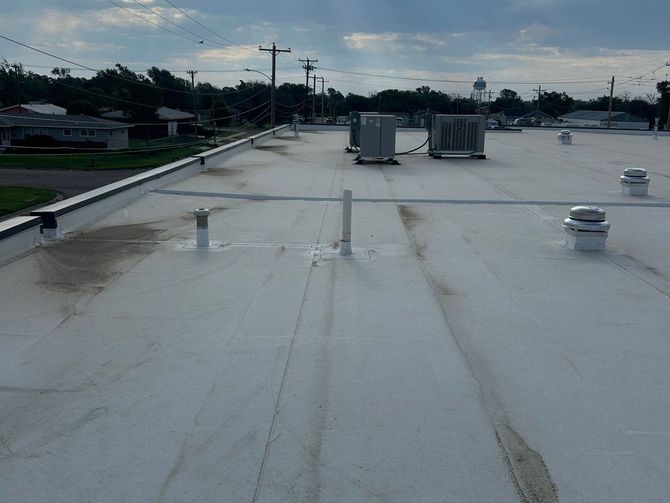Choosing the proper industrial roofing system is essential for protecting your property and enhancing its longevity. In this article, we’ll walk you through the key factors in selecting the right roofing system and maintaining it properly to avoid costly mistakes.
Things to Keep in Mind for Your Industrial Roofing Project
When undertaking an industrial roofing project, there are several factors to account for, given the specific needs of large-scale buildings. Keep these considerations in mind:
- Building Use: Different industrial buildings may have varying needs, such as heat resistance, weather durability, or soundproofing. Understanding your building’s purpose helps select the right roofing system.
- Environmental Conditions: Local weather conditions like temperature extremes, heavy rainfall, or snow can impact roof material performance. Choose a roofing system that can withstand your area’s climate.
- Budget: While industrial roofing can be costly, finding the right balance between quality and affordability ensures you get the best return on investment.
- Energy Efficiency: Opting for energy-efficient roofing materials can help lower energy costs by improving insulation and reducing the need for heating and cooling.
Types of Industrial Roofs: Built-Up, Metal, and Modified Bitumen
Industrial buildings often use specific roofing systems. Below are some of the most common types that provide advantages based on the structure's needs.
Built-Up Roofs (BUR)
Built-up roofing systems (BUR) are composed of several layers of materials, such as tar and gravel, providing excellent waterproofing and durability. However, this system can be complex and labor-intensive to install.
Metal Roofs
Metal roofing is a durable and low-maintenance option that performs well in extreme weather. Its reflective properties also improve energy efficiency by reducing cooling costs. Metal roofs come in multiple materials, including steel, aluminum, and copper.
Modified Bitumen Roofs
Modified bitumen combines asphalt with rubber or plastic polymers, resulting in a flexible and durable roofing solution for low-slope buildings. Its resistance to leaks makes it a reliable choice for industrial structures.
How to Keep Your Industrial Roof in Top Condition and Avoid Expensive Repairs
To avoid costly repairs and extend the lifespan of your industrial roof, regular maintenance is crucial. Follow these tips to keep your roof in excellent condition:
- Regular Inspections: Have your roof inspected by professionals at least once a year to catch early signs of damage, like cracks, leaks, or debris buildup.
- Clean Gutters and Drains: Ensure gutters and drains are clear of debris to prevent water buildup, which can lead to roof damage.
- Prompt Repairs: Address any issues quickly to prevent further damage. Delaying repairs can result in larger, more expensive problems later.
- Coating and Sealing: Protective coatings and sealants can prevent moisture and UV damage, helping to extend the roof's life.
Why Working with an Expert Roofing Contractor Is Crucial for Industrial Projects
Hiring a specialized roofing contractor is essential for ensuring your roof is installed correctly and maintained properly. Experts can help you choose materials, manage the project, and provide long-term support.
Conclusion: Choosing the Right Roofing for Your Business
Selecting the right industrial roof is key to safeguarding your property and ensuring it lasts long-term. Understanding your options—BUR, metal, or modified bitumen—will guide your decision. With a specialized contractor, you can ensure optimal installation and maintenance for years of protection.
Looking for a trusted roofing partner for your industrial needs? Reach out to us today for tailored roofing solutions and expert guidance!

#IndustrialRoofing #CommercialRoofing #RoofInstallation #BuiltUpRoof #MetalRoofing #ModifiedBitumen #RoofMaintenance #EnergyEfficientRoofing